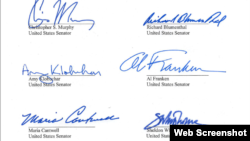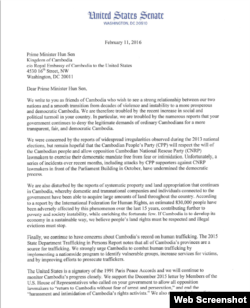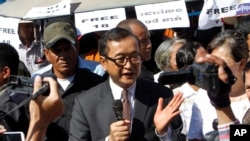A year after seven U.S. Senators sent a letter to Cambodia’s Prime Minister Hun Sen voicing their concerns about human rights, Cambodian observers see a deteriorating political situation inside the country.
The senators jointly sent an open letter to Hun Sen last February, expressing their concerns about land grabbing, democratic governance and harassment and intimidation of the country’s rights activists and opposition party members.
Concerns are increasing, analysts say, ahead of local commune elections scheduled nationwide for June and a general election in 2018.
“Concerning what the U.S. senators mentioned [in the letter], the government has done nothing significant about them,” Yoeurng Sotheara, a legal officer of election watchdog Comfrel, told VOA Khmer in a phone interview on Tuesday.
“For election reform, we have seen that it’s getting better, but regarding the political situation or environment, it’s getting cloudier, especially in the months in the run up to the elections.”
The seven senators, all members of the Democratic Party, said in their letter, dated February 11, 2016, that as friends of Cambodia, they were troubled by “the recent increase in social and political turmoil in your country”.
“In particular, we are troubled by the numbers of reports that your government continues to deny the legitimate demands of ordinary Cambodians for a more transparent, fair and democratic Cambodia,” they said.
Preap Kol, executive director of Transparency International Cambodia, told VOA Khmer that he has not seen any improvements regarding land grabbing or the cases against rights activists and opposition officials, including American citizens.
“In regard to these big issues, for the past year, we see that there seems to be a kind of attitude Cambodia has shown that it has not been preparing itself to respond or improve the situation as requested by the U.S senators.”
The seven senators were Christopher Murphy and Richard Blumenthal of Connecticut; Amy Klobuchar and Al Franken of Minnesota; Maria Cantwell of Washington state; Sheldon Whitehouse of Rhode Island, and Elizabeth Warren of Massachusetts.
The group stated in the letter that they were still hopeful that the ruling Cambodian People’s Party would respect the will of the Cambodian people and allow the opposition Cambodian National Rescue Party “to exercise their democratic mandate free from fear or intimidation.”
The senators also said they supported members of the U.S. House of Representatives who had called on Hun Sen’s government to allow all opposition lawmakers to “return to Cambodia without fear of arrest and persecution” and end the “harassment and intimidation of Cambodia’s rights activists.”
Kim Sok, a Phnom Penh-based social analyst and former university lecturer, told VOA Khmer on Tuesday that rather than considering the substance of the senators’ letter, Hun Sen and his ruling CPP party seemingly have ignored it.
“It’s been like a policy that does not take the U.S. senators’ letter into consideration but instead they have been on a provocative act by creating more severe problems,” he said.
“The most serious thing is that they seem to be preparing themselves to rob power before the elections somehow and not getting ready to compete in the elections,” Sok said.
Sok Eysan, CPP spokesman, said Cambodian leaders are working to improve society and that the country does not follow the demands of foreigners.
“The Kingdom of Cambodia is a sovereign and independent state, so what has not been in the national sovereignty, we cannot do just as outsiders who wrote any wandering letter,” he told VOA Khmer.
“In the U.S., not all the 300 million people are millionaires. The millionaires account for just a few, too,” said Eysan. “So, I think those ... senators seem to see everything negative in Cambodia.”
“The CPP has had no intention of blocking or preventing [opposition leader] Sam Rainsy from competing in the elections, but he himself was involved in court cases and did not dare to return to Cambodia because he is afraid of prison, so do not blame others,” Eysan said.
Eang Vuthy, director of a local non-governmental organization Equitable Cambodia based in Phnom Penh, said the U.S. as a donor country has the right to voice its concerns and has an obligation to request all state parties to human rights conventions and treaties and that human rights be protected.
“Eventually, it’s the Cambodian government who is the decision maker of what to do to improve the human rights situation. It is the state’s obligation, especially for the state that is serving its own citizens,” he said.











